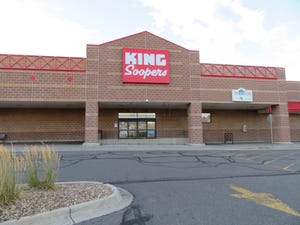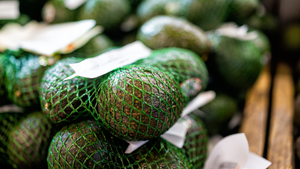Tea SetsTea Sets
As demand for antioxidant-rich blends and conveniently consumable beverages continues to swell, grocers' ready-to-drink beverage sections are amounting to a sea of tea. The most commonly consumed drink after water, tea is also one of the fastest-growing beverage categories. Sales of RTD tea in particular grew almost 19% to $1.2 billion in food, drug and mass channels, excluding Wal-Mart, during the
March 31, 2008
LIZ PARKS
As demand for antioxidant-rich blends and conveniently consumable beverages continues to swell, grocers' ready-to-drink beverage sections are amounting to a sea of tea.
The most commonly consumed drink after water, tea is also one of the fastest-growing beverage categories.
Sales of RTD tea in particular grew almost 19% to $1.2 billion in food, drug and mass channels, excluding Wal-Mart, during the 52 weeks ending Feb. 24, according to Information Resources Inc., Chicago. Packaged Facts, Rockville, Md., projects that the category will maintain its year-on-year growth momentum. Its recent “Tea and Ready-to-Drink Tea in the U.S.” report forecasts that category sales will soar to a whopping $7.3 billion by 2012. That equates to 20% annual growth for shelf-stable RTD tea and 10% to 15% for refrigerated RTD tea. Convenience, health and flavor trends will continue to drive the burgeoning category, said David Sprinkle, research director at Packaged Facts.
Moving quickly to capitalize on the spike in sales, supermarkets are expanding their assortments of RTD teas and merchandising the most popular brands in their Center Store beverage sections, natural food departments and refrigerated cases.
Stop & Shop, Quincy, Mass., expanded the space it dedicates to the category in the juice aisle last summer by 25% to 20 feet, according to Robert Keane, spokesman for the chain. RTD tea is continuing to experience substantial category growth, he noted.
“Innovations such as green teas, red teas, white teas, as well as flavored teas, have offered more variety to the consumer,” said Keane. “Ready-to-drink teas are also being viewed as a healthier alternative to carbonated soft drinks.”
With health-conscious consumers reaching for better-for-you beverages, the carbonated category has taken a hit. Unit sales of CSDs were down 5.6% during the four-week period that ended Feb. 24 compared with the previous year, according to IRI. The drop in dollar sales was less severe at 1.9%.
St. Paul, Minn.-based Kowalski's Markets expanded its assortment of RTD teas by about 20% last year in response to brisk category movement, according to Deb Leland, natural and specialty food buyer for the eight-unit retailer.
Kowalski's merchandises the teas in its general market beverage set and also in four- to eight-foot specialty tea sets that include a variety of smaller specialty brands, including Sweet Leaf, Tazo and Honest Tea. A banner that hangs from the specialty tea area's edge and reads “Natural Path” helps shoppers identify brands with natural ingredients and enhanced health benefits.
MAKE ROOM FOR MORE
Kowalski's will allocate an additional two to four feet to the category in the near future, Leland said. Extra space is necessary since consumers are trading up to larger sizes, she noted. The retailer is still studying whether or not it will take space from its carbonated soft drink section.
“Health benefits are driving sales in the ready-to-drink tea category,” noted Leland. “Scientists have shown that there are health benefits in both green and black tea.”
Indeed, shoppers reach for these teas in the hopes of reaping positive health attributes. Tea contains polyphenols, which have antioxidant properties that are thought to protect the body from free-radical damage. Scientific studies also suggest that the polyphenols in tea may reduce the risk of gastric, esophageal, skin and ovarian cancers in those who consume four to six cups daily. Some studies have also shown that polyphenols help lower cholesterol.
Unique flavor profiles also incite trial at Kowalski's, Leland noted.
“I think people find the beverages very enjoyable,” she said. “There is a great variety of nice flavors.”
Teas flavored with blended fruits, or individual fruits such as lemon, peach and raspberry, or with herbal flavors and spices, are very popular. More exotic flavors are also coming to market as tea makers infuse exotic fruits such as acai, goji berries and mangosteen into their beverages.
At Lakeland, Fla.-based Publix Super Markets, shelf-stable RTD teas are merchandised in eight- to 12-square-foot sections that are adjacent to or located across from soft drinks, spokeswoman Maria Brous told SN. Publix also merchandises some of the most popular brands of tea in a refrigerated section in its deli department. It regularly advertises RTD teas to draw traffic, promoting temporary price reductions in weekly ads.
Brous said that consumer preference for better-for-you beverages has been one of the driving forces behind the category's strong growth.
Tea marketers have also boosted sales with their “full arsenal of promotional techniques to build brand awareness, including coupons, games, contests, sweepstakes, rebates, merchandise tie-ins, charity sponsorships and sports/entertainment sponsorships,” said Packaged Facts' Sprinkle.
Retailers are also working hand-in-hand with RTD manufacturers and doing “an awful lot to promote their products,” said Leland.
In addition to featuring RTD ads in its circulars and promoting them as part of five-for-$5 offers, Kowalski's also devotes full endcaps to the category, especially during the spring, summer and early fall.
Some of the brands with the strongest growth in Kowalski's stores right now are Tazo, Sweet Leaf, Hanson, Lipton and Snapple. One new addition to the mix is a collection of Dr. Weil's Wellness teas, a new line launched last year by Dr. Andrew Weil, author of several best-selling books on wellness.
Mintel's Morris said that retailers can expect to see RTD tea continue to exhibit strong growth in the future, driven by new product introductions. During the third quarter of 2007 alone, 306 new RTD teas hit store shelves. Also, specialty brands like Hanson, Honest Tea and Arizona are continuing to gain expanded distribution.
“Although there has been a decline from the really high growth in 2005, I'm not seeing the growth in 2008 faltering,” said Morris.
He highlighted Lipton's success. “It performed very well with its ready-to-drink green teas introduced in 2005,” Morris said. “At the end of 2006, they were generating $160 million in sales.”
Morris sees opportunities to improve sales potential by catering to untapped markets.
“There is even more opportunity to grow if tea manufacturers can reach some undeveloped target markets such as Hispanics who, as a group, are not big tea drinkers,” he said.
GREAT POTENTIAL
Jeffrey Klineman, editor of Cambridge, Mass.-based BevNet.com, a website that reviews new beverages for an audience of distributors, retailers and consumers, said that RTD tea is one of the segments with the most potential.
“I think we see that in Coca-Cola's recent acquisition of 40% of Honest Tea, as well as in the acquisition interest in other small but fast-growing companies like Sweet Leaf,” he said.
In February, Coca-Cola acquired a 40% interest in Bethesda, Md.-based Honest Tea, with an option that would allow it to buy all of the company in the future. The acquisition came almost a year after the Atlanta-based manufacturer's acquisition of Englewood Cliffs, N.J.-based Fuze Beverage, a maker of enhanced juices and teas.
“We started Honest Tea 10 years ago with modest resources, but an ambitious vision for offering a new type of beverage — a delicious healthier drink produced with a consciousness about the way the ingredients are grown,” said Seth Goldman, co-founder and “TeaEO” of Honest Tea, in a statement. “As more consumers become aware of how their decisions impact the health of the planet and themselves, we are thrilled to receive this investment from the world's largest beverage company to help take our brand and our mission to a larger scale and wider audience.”
Through Coca-Cola's widespread distribution network, Honest Tea is expected to quickly achieve full distribution in general-market food stores as a mainstream beverage.
“Honest Tea is on the forefront of the rapidly growing organic beverage business, and Seth Goldman and his management team have successfully anticipated and met consumer needs in this expanding category,” said Deryck van Rensburg, president and general manager, Venturing and Emerging Brands, Coca-Cola North America, in a statement. “This transaction is a superb example of our mission in VEB to seek out and invest in the best beverage entrepreneurs and the highest-growth-potential beverages.”
Deals like these may quench mainstream consumers' growing thirst for exotic ingredients. Yerba Mate, for instance, a plant grown in South America, is being added to specialty teas. Yerba Mate is a stimulant that is thought to be easier on the stomach than coffee.
“A lot of the ingredient suppliers that we talk to consistently mention teas and tea extracts as one of the ingredients that beverage manufacturers are most interested in,” said Klineman.
And as large manufacturers begin to consolidate recent acquisitions of, or investments in, smaller tea companies, sources say growth in RTD teas could be even more dramatic next year than it was this year.
BEVERAGE WATCH
Inflated milk prices lifted dollar sales despite a drop in units sold. Meanwhile, consumers are buying more beer, wine, bottled water and refrigerated juices/drinks.
| CATEGORY | $ SALES | % CHANGE VS. YEAR AGO | UNIT SALES | % CHANGE VS. YEAR AGO |
|---|---|---|---|---|
| Milk | $1.020B | 14.2 | 335.3M | -4.6 |
| CSDs | $963.5M | -1.9 | 462.3M | -5.6 |
| Beer/Ale/Alcoholic Cider | $640.2M | 2.8 | 80.3M | 1.0 |
| Wine | $468.5M | 3.1 | 54.6M | 0.7 |
| Bottled Water | $370.0M | 5.5 | 187.1M | 8.0 |
| RFG Juices/Drinks | $364.6M | 2.6 | 124.0M | 1.5 |
| Source: Information Resources Inc. * Sales in food, drug and mass (excluding Wal-Mart) for the four weeks that ended Feb. 24 | ||||
About the Author
You May Also Like




